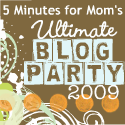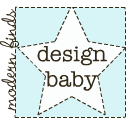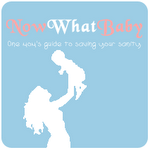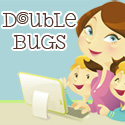No matter how you slice it, having a child is an expensive endeavor. In my post The Good, the Bad and the Ugly: Part II, I listed some of the expenses you can expect to encounter along the way. Since I myself am not independently wealthy, I have been looking for ways to save a little money (and a little sanity) whenever possible. Here are my tips & tricks for easing the crunch and easing your mind.
1. BE INFORMED!
Knowing is half the battle, right? There are so many products on the market today for babies and new moms, so many different brands and styles and sizes, meant for different uses and purposes. It can be extremely confusing and overwhelming walking into a Babies R Us for the first time and seeing aisle after aisle of product to choose from. If you go in blind, chances are good you're going to make some unecessary, overpriced, wasteful purchases.
So, do your research. One helpful resource is a guidebook. These books give you product reviews and bargain hunting tricks, offer comparisons of brands and models, point out what to look for when buying key items, and help you distinguish between what you may want and what you need. Baby Bargains: Secrets to Saving 20% to 50% on Baby Furniture, Gear, Clothes, Toys, Maternity Wear and Much, Much More! comes very highly recommended (and, considering it's currently in its 8th edition, it seems to have been successful for some time).
The internet can be another great resource as long as you're thorough. The good thing about a book is that the author has already weeded through a lot of the available information and combined that with his or her own experience to give you what they believe are the best recommendations available. The internet has no such filter. You will finds all sorts of information and disinformation, some of it useful and some of it not. To guard against this, don't take one person's word for it - make sure you look in more than one place. The more sites you find echoing the same suggestion or recommendation, the more you can rely on that piece of advice.
Manufacturer's websites are good for looking at the available products, models, prices, and product details, but they typically do not provide the whole story. You're likely to find a lot of "pro's" and not a lot of "con's". You'll want to read product reviews and recommendations from people who have actually bought and used the product to see if there are any drawbacks or issues with the products.
For example, while shopping for a crib for the nursery, I came across one the looked really nice and seemed to have all the features I was looking for - and was moderately priced to boot. I even went and saw a floor model of the crib in person and everything looked good. When I got back home, I went online to read customer's reviews about the crib. It turns out that more than half of the reviewers complained that the dropside stopped working after only a couple months of use, and that the company did not currently offer a fix for the problem. Needless to say, I decided not to purchase that particular crib.
Look at the specifics of each item's intended use, purpose and age group. Certain products are made for newborns up to 6 months, others for babies 6-12 months, and so on. You don't want to buy too many for one age group and not enough for another, thinking they're all the same. One thing I didn't know before reading the fine print is that different bottle nipples produce a different "flow", each of which has a different purpose and is meant for different ages. If I hadn't been paying attention to the details, I would likely have bought nipples that my newborn couldn't even use.
Definitely check for product recalls before you buy. The US Consumer Product Safety Commission website has a looooong list of the most recent recalls.
You also need to be able to discern between what is really necessary, what might be helpful but not necessary, what is completely optional, and what is just plain useless. There are chapters in the guidebooks and sites online that will help you with that, but the ultimate purchases are up to you. Do you really need a video baby monitor so you can see your sleeping baby at all times? Do you really need a changing table or do you have a nice sturdy dresser whose top you could convert into a changing area? Do you really need a machine that warms up the babies wipes for you? Do the scented diaper pails really work or are they more hype than help? Are walkers really advisable from a safety perspective? There are articles and information out there about all of these things and more to help you decide if they're actually purchases you need (or even want) to make.
Also, are there things you may want later on but don't need right away - purchases that you can maybe put off so you don't break the bank all at once. Obviously, your newborn won't need a high chair immediately, for instance, or sneakers, or wordy books. Consider spending only what you need to now and save the rest for later.
Finally, ask other parents. There is no greater resource than the people who have been there before you. What kinds of items did other parents totally love? Which ones did they hate? Did they buy or receive things that they never ended up using? Is there an item they just couldn't live without? Can they recommend a particular brand that they really trust? Just like the online customer reviews, getting feedback from actual parents who have used the products will be invaluable.
2. BE THRIFTY!
This is my favorite category because it's sort of like a treasure hunt. If you had endless resources and a bottomless bank account, you could easily walk into any baby superstore and walk out with everything you could ever need or want for baby, all shiny brand new, with little time and even less effort. Hell, you could pay someone to do your shopping for you and not even have to be involved! But since most of us have yet to hit the lottery, it pays to know where and how to find gently used items for a fraction of the cost, as well as how to save some money when we do have to buy brand new.
Don't be afraid to accept good condition hand-me-downs. As long as they are clean and still in good shape (and safe, of course), baby won't know the difference, so what's the big deal? Baby stuff takes up a lot of room, so often parents of older children are dying to get rid of their old baby stuff. Clothes, toys, swings, activity mats, playards, stationary entertainers, diaper bags, crib linens - again, as long as they're all in good condition, no missing parts, no questionable safety concerns, they're all just as good as the brand new stuff.
Check out consignment stores and garage sales. I found some great maternity clothes at a consignment store just a few exits from my house - I got 3 shirts and 2 pairs of pants there for $50, all brand name! And the great thing about consignment stores is that product cycles in and out of there frequently, so you can go back a couple weeks later and find all new stuff! It's not quite tag sale season around here yet, but we're getting close and I can't wait to spend a lazy Sunday driving around and checking out the bargains I can find on toys, books and clothes for the little one. Also check out uaction sites like Ebay, or local classified-style listings like Craigslist and Freecycle, where you can find a large variety of used items that people are either selling or giving away.
One thing you probably should not buy used is your baby's crib. For one thing, safety standards for cribs have changed dramatically over the years and there are recalls happening all the time.
Of course, you can't buy everything used. So when you do buy new items from a store, make sure you:
- Keep your receipts. You may purchase something that turns out to be the wrong size, be impractical, not quite serve its intended purpose, or whatever - and you always want to the option to return or exchange it if that turns out to be the case.
- Price compare. Don't just buy the first one you see of anything - you might be able to find it a couple bucks cheaper, or on sale, at another location.
- Use coupons for in-store shopping and coupon codes for online shopping. Check weekly circulars for in-store savings and clip coupons in your weekend paper. There are online sites where you can print coupons and even get free samples.
When I'm doing any online shopping, I never check-out before I search the web for any availble coupon codes that may be out there. If you've done a fair amount of online shopping, you've probably seen the field on the check-out screen where it asks for a "Coupon Code" or "Promotional Code", something along those lines. There are websites where people list codes for others to use, either for a percentage off your order or free shipping or some other money-saving deal. I usually just Google the store I'm shopping at followed by "coupon codes" - so if I was buying something from Target.com, I would do a Google search for "Target coupon codes" and I would get a list of sites that have codes for that store. Not all of them will be relevant to your order, some of them will be expire, and some may just not work, but it's worth looking and taking a shot.
- Shop at discount stores like Target and Walmart, or check out outlet stores. I found some cute maternity clothes at Target for fairly cheap - of everything I bought there, my big "splurge" was a $30 pair of gray maternity dress pants for work made of this great lightweight material that fit like a dream and are so comfy. I also found a lot of cute things on sale at the nearby Motherhood outlet.
- Shop the sales. I always check the sale racks first whenever I go shopping, and I often check the weekly circulars to see if there might be anything on sale that I know we need or will need in the near future. Sometimes if I know ahead of time I'm going to need something in the upcoming months, I'll try to wait and find it on sale instead of buying it right away. I know a few people who do a lot of their Christmas shopping for the following year at after-Christmas sales. Don't buy things you won't really use or don't really like just because they're on sale, but if you're in the market for something you should try to take advantage of sale prices whenever possible.
- Buy out-of-season. If you buy a winter coat in June, it's going to be cheaper than if you were to buy it in December. A lot of clearance and sale items you find will be last season's styles. Just make sure you plan ahead in regards to sizes and age appropriateness.
- Buy in bulk. There are some things that you just know you are going needs lots of - diapers, wipes, formula, whatever it is. It's cheaper to buy those items in large quantities all at once than to buy a pack here and a pack there. Wholesale warehouses like BJ's and Sam's Club are great for stocking up on frequently used items, especially for larger households.
- Save your change. This might not sound like a big deal, but this little coins can really add up. You're not going to become a millionaire by throwing your unused pennies in a jar, but you could save up enough to buy a new toy, a DVD, a tank of gas, or even a nice dinner out for mom and dad!
3. BE CREATIVE!
Are you crafty? Can you sew, knit, cook, draw, paint? Homemade goods are definitely a cheap alternative to store-bought products, are more personal, and can often be better quality. Instead of buying expensive framed prints for baby's walls, paint something yourself! Instead of buying designer baby booties that he'll outgrow in a few months, take some time to knit a pair! Instead of buying expensive jarred baby food, buy some fresh fruits and vegetables or save your leftovers and make your own! There are food processors out there specifically for making your own baby food, and some parents swear by it, not only because it's cost-friendly, but because of the nutritious benefits as well.
A friend of the family recently had a little boy, and her mother came up with a great idea for wall-hangings in the baby's room: she went out and bought a copy of the mom's favorite from when she was a kid and cut out some of the illustrations and framed them. She not only created something cute and inexpensive for baby's room, but it has special significance to mom and grandma, too.
Another tip: recycle. Do you have an old dresser in the attic that's still in good shape but could use a new coat of paint? Roll up your sleeves, break out the sandpaper and and a paintbrush and voila! A new dresser for the nursery! No need to spend hundreds of dollars on a brand new piece of furniture. You can even buy some cute drawer knobs and drawer liners, or add stenciling, to really make it nursery-friendly and make it look like you spent a pretty penny at the furniture store. Got a plain old lamp that you're not really using? Paint the buy in fun, bold colors, pick up a new lamp shade in a cute pattern that matches the rest of the nursery, maybe add some polka dots or sparkles, whatever works for you - and now you've got a new lamp for the baby's room! You don't have to be artfully-inclined to do simple projects like these. Taking things you already have and making little changes or improvements can save you a ton of money over buying the same items brand new - and it might help you clear out some space in your attic!
4. BE REALISTIC!
- Sit down with your partner and really bang out your budget so you have a clear picture of what you have to work with.
- Recognize that there will be a few necessary splurges along the way. Plan for them.
- Accept your financial limitations and set boundaries.
- Know when to ask for help if you need it.
- Learn to say no. You're not going to be get everything you or your children might want, so do what you can, compromise when possible, and try not to stress about it.
- Don't waste your time worrying about what others think or what others have. If the mom next door has her nursery decked out in the most expensive designer brands sporting all the bells and whistles, so what. That is obviously more for her than for her baby, since he won't know the differnce in the slightest and probably won't even use half the stuff she packed the room with.
One final tip: if you know that you will be having a baby shower, it might be a good idea to wait until afterwards to go on a spending spree - chances are you'll get a lot of the items you want and need as gifts without having to spend a dime!



































No comments:
Post a Comment